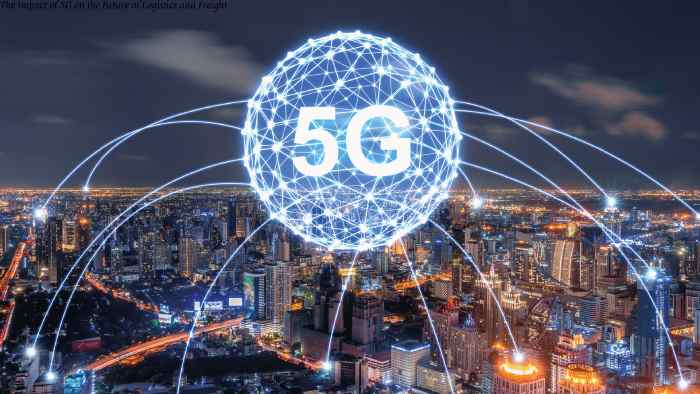The Impact of 5G on the Future of Logistics and Freight

The Impact of 5G on the Future of Logistics and Freight
Industries are always looking for new ways to use technology to enhance operations and offer top-notch customer service in the era of fast digital change. Similar developments, such as freight forwarding software and systems, have greatly aided in simplifying procedures in the freight and logistics industry. The introduction of 5G technology is one of the most recent and significant breakthroughs in this field.
5G is expected to play a pivotal role in revolutionizing the freight and logistics sector as the globe pushes ever more towards connectivity and digitization. It is not only about speedier connectivity; it heralds the beginning of an age of incredible efficiency, real-time data management, and previously unthinkable tracking precision. Strong, intelligent, and flexible logistics systems may be possible because of the interaction between 5G and freight forwarding technologies. This blog article will examine how the future of logistics and freight is changing due to 5G.
Table of Contents
Freight Forwarding System Evolution
Freight forwarding used to be a difficult and time-consuming business. The software has greatly streamlined these processes since its launch. These systems have completely changed the business, from organizing orders to monitoring shipments. This trend may advance further by incorporating 5G into freight forwarding systems.
Although many logistical duties have been automated by goods forwarding software and the number of human mistakes has decreased, 5G technology opens up possibilities for future development and sophistication. This strong mix could produce better decision-making algorithms, rapid communication, and increased operational efficiency. These technologies can manage larger amounts of data, process them more quickly, and give more precise insights, adding value to the supply chain.
The high-speed, low-latency capabilities of 5G can enable freight forwarding solutions to track shipments in real-time, offer precise ETAs, and quickly respond to unanticipated events, which is important in a sector where on-time deliveries are essential. Furthermore, shippers, transporters, and customs authorities may work more effectively together when using 5G-enabled technology, which can help with goods forwarding. This may result in more efficient business processes, quicker product clearance, and a more seamless consumer experience.
The Potential of 5G in Logistics and Freight
Faster internet speeds are only one benefit of 5G, the fifth-generation technological standard for broadband cellular networks. It involves building a network to manage increasingly linked devices, generating new prospects for the goods and logistics sector.
Efficiency and Quickness
In the goods forwarding system, 5G technology may boost productivity and speed by slashing the time needed for data processing and device-to-device communication. Faster and more effective order and shipment management may result from integration with freight forwarding software.
Real-time monitoring and openness
Due to its low latency, 5G enables real-time data transfer, allowing for immediate shipment tracking and total transparency for all parties involved. This might be a game-changer in the era of e-commerce when buyers expect prompt delivery and continuous updates.
In addition to providing immediate updates, 5G networks’ low latency can support goods forwarding solutions’ ability to anticipate and quickly address future supply chain problems. This can include delays brought on by inclement weather, heavy traffic, or unforeseen delays at customs. Real-time data transmission capabilities of 5G can alert interested parties to such events immediately, enabling quick re-routing or the implementation of other emergency measures. In the fiercely competitive world of e-commerce, this degree of proactive problem-solving may drastically reduce delays and preserve consumer happiness.
Future Solutions for Freight Forwarding with 5G
Advanced Fleet Management
Freight forwarder software will be able to perform more intelligently thanks to 5G. Real-time insights about fleet status, including vehicle health, ideal route, and driver performance, may be obtained from it. This aids in preemptive issue resolution, saving time and money while ensuring effective operations.
Logistics and IoT
The freight and logistics sector has already begun to see the impact of the Internet of Things (IoT), and 5G will accelerate this trend. Smart sensors and trackers from the Internet of Things (IoT) can provide data to goods-forwarding systems. These systems can process data in real time with the high-speed, high-capacity networks of 5G, substantially enhancing operations.
Uncrewed Vehicles
5G is one of the primary enabling technologies for the impending revolution in driverless vehicles. It can provide real-time decision-making and routing depending on traffic and weather conditions, enabling seamless communication between autonomous cars and goods forwarding systems. This has the potential to increase delivery dependability and efficiency greatly.
The freight and logistics sectors have much to gain from adopting 5G in freight forwarding systems. The advantages are significant and transformational, ranging from real-time tracking to the advent of driverless cars. The future of freight and logistics is more efficient, transparent, and customer-focused than ever as the 5G revolution takes shape.
Adopting and adjusting to this new technology will be the difficult part. However, in the increasingly digital world of commerce, goods and logistics firms that can make this shift smoothly stand to gain a considerable competitive edge. Therefore, adopting 5G is essential for the future of goods forwarding and not simply a choice.
To handle all activities on a single digital platform and offer top-notch freight forwarding services, Longitude World offers freight forwarders cutting-edge freight forwarding software.
Also read:-Microservices Testing: Understanding the Issues and Benefits




